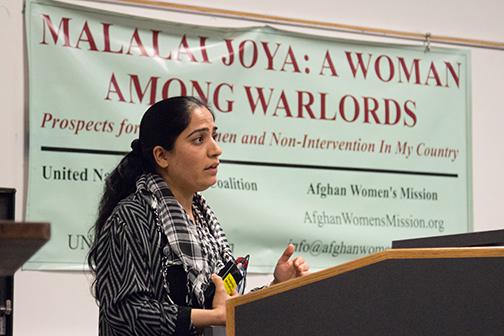The Bread and Roses Center of the Department of Women’s Studies and the Center for Intercultural Relations at San Diego State hosted women’s rights activist Malalai Joya on Tuesday night. Joya is a prominent activist from Afghanistan who opposes U.S. and coalition forces in her home country.
Joya spoke about foreign troops in Afghanistan and the situation for women in her country.
A former member of the Afghanistan parliament, Joya was ousted when she spoke out against government corruption in her country. Up to four attempts have been made on her life, but she still lives in Kabul, where she moves between safe houses every few weeks. Joya called the current Afghanistan regime a “puppet regime” and a “Mafia Regime.”
Joya is equally as critical of the U.S. government’s presence in Afghanistan.
“The U.S. and NATO are supporting the most brutal and infamous fundamentalist groups in Afghanistan, who are sworn enemies of women’s rights,” Joya said.
Joya said the best solution for Afghanistan is for all foreign troops to leave now.
“Afghanistan is one of the most dangerous places in the world to be a woman,” Joya said. “Scores of women commit suicide in Afghanistan because they see no other way out.”
Joya showed the audience pictures of women in Afghanistan today compared to when Afghanistan was ruled by a king. In older photos, women were dressed in western style clothing, compared to now where they are forced to wear the burka, an article of clothing that covers their entire body.
Joya doesn’t like wearing the burka, but is forced to when she is in Afghanistan to guard her identity and keep her safe.
A large number of students attended her lecture and expressed positive reactions about the presentation.
History junior Brandon Angeles said some SDSU professors are apolitical, and listening to the speech was refreshing.
“It’s good to expose Aztecs to radical truth,” Angeles said.
Political science junior Mariam Omar said hearing a different take on Afghanistan helped broaden her horizons.
“It’s interesting to hear her perspective and not what the mainstream media is saying,” Omar said.
Mechanical engineering junior Khyber, who is an Afghan and asked to not have his full name printed, also shared his opinion.
“I’m really glad to see her here and drawing attention on a global scale to something that needs to be changed,” Khyber said.
Associate professor of women’s studies Doreen Mattingly was glad to have her speak as well.
“We try to bring people in like this because it’s easy for Americans to forget there are female activists in these regions,” Mattingly said. “It’s much better to work with them instead of having our own agenda for them.”
Photo by Jonathan Bonpua







